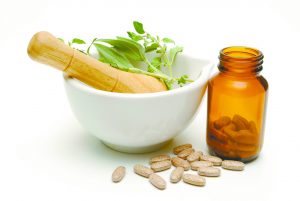 The thyroid is a tiny butterfly shaped gland in the neck that is made up of two distinct lobes. The thyroid gland predominantly produces thyroxine (T4) which is converted to the active form of thyroid hormone, triiodothyronine (T3), primarily in the liver.
The thyroid is a tiny butterfly shaped gland in the neck that is made up of two distinct lobes. The thyroid gland predominantly produces thyroxine (T4) which is converted to the active form of thyroid hormone, triiodothyronine (T3), primarily in the liver.
Hyperthyroidism is a condition where the thyroid is overactive in producing thyroid hormone. Hyperthyroidism can be brought on by genetic conditions, an autoimmune disease that makes the body attack its own thyroid, or it can be exacerbated from tumors in the reproductive glands. The symptoms of a hyperactive thyroid are an unusually large appetite, nervousness, anxiety, weight loss, nausea, vomiting and dry hair and skin.
Hypothyroidism is defined as low levels of thyroid hormone caused by an underactive thyroid gland that is incapable of producing enough T4 to keep the body optimally functioning or has difficulty converting T4 into the active form, T3. Some common causes of hypothyroidism include cancer, removal of the thyroid gland, autoimmune diseases, environmental toxins and radiation therapy. Some factors affecting the conversion of T4 to T3 include liver disease, nutrient deficiencies, medications and stress. When thyroid hormone levels fall too low, the body’s processes tend to slow down causing symptoms, such as sensitivity to cold, weight gain, constipation, dry skin, brittle nails, depression and swollen, puffy eyes.
While the most common test for thyroid disorders is a TSH (thyroid stimulating hormone) level, there are other levels that should be reviewed in order to have a complete picture of thyroid function. It is important to also look at free T3 and T4 levels, reverse T3 and thyroid antibodies.
Compounded Thyroid Medications vs Manufactured Pharmaceuticals
While prescribing manufactured T4 (i.e. Synthroid) may help for most hypothyroid patients, it may not address every patient’s needs. For patients who have difficulty converting T4 to T3, they get the most benefit from the addition of both T4 and T3. Again, it is vitally important to look at each patient on an individual basis and prescribe according to that patient’s specific levels. A tailored regimen for addressing a patient’s thyroid function is ideal.
This can easily be accomplished by a compounding pharmacist collaborating with the patient’s physician in tailoring a regimen to the specific needs of the patient. Compounded thyroid medications contain a specific ratio of T4 and T3 based on patient lab values.
Commercially available thyroid medications contain fillers and excipients that may not be well tolerated by all patients. Through compounding, these fillers and excipients can be removed, allowing patients to receive the benefits without the reactions to these additives. Furthermore, many patients experience side effects from manufactured thyroid medications since they are immediate release and are formulated to release the active drug, in this case thyroid hormone, immediately after oral administration. This sudden increase of thyroid hormone can cause side effects, such as heart palpitations and flushing. A compounding pharmacy, however, can compound thyroid hormone as a sustained release capsule. A sustained release capsule is designed to release the active drug at a predetermined rate in order to maintain a constant drug concentration for a specific period of time with minimum side effects.
It is important to choose a reputable compounding pharmacy when having any medication compounded, including thyroid hormone. Custom Meds has achieved PCAB accreditation. The Pharmacy Compounding Accreditation Board (PCAB) only grants accreditation to those pharmacies that pass a set of rigorous standards, including using only high quality pharmaceutical grade chemicals, frequently testing finished products to ensure potency and purity, passing a thorough on-site inspection and continually training and educating its pharmacists and technicians.
Jessica DiLeo, PharmD is a compounding pharmacist at Custom Meds, Inc. in Inverness, Florida. Dr. DiLeo received her doctorate of pharmacy in 2009 from the University of Florida and eventually became the owner of Custom Meds Compounding Pharmacy in 2011. She can be contacted at jessica@custommeds.com.
Custom Meds
352-341-1212
www.custommeds.com
Check Also
CUSTOMIZABLE LIGHT ADJUSTABLE LENS A GAMECHANGER FOR CATARACTS PATIENTS
All Americans have some degree of cataract change by the age of 75. As the …
 Central Florida Health and Wellness Magazine Health and Wellness Articles of the Villages
Central Florida Health and Wellness Magazine Health and Wellness Articles of the Villages



